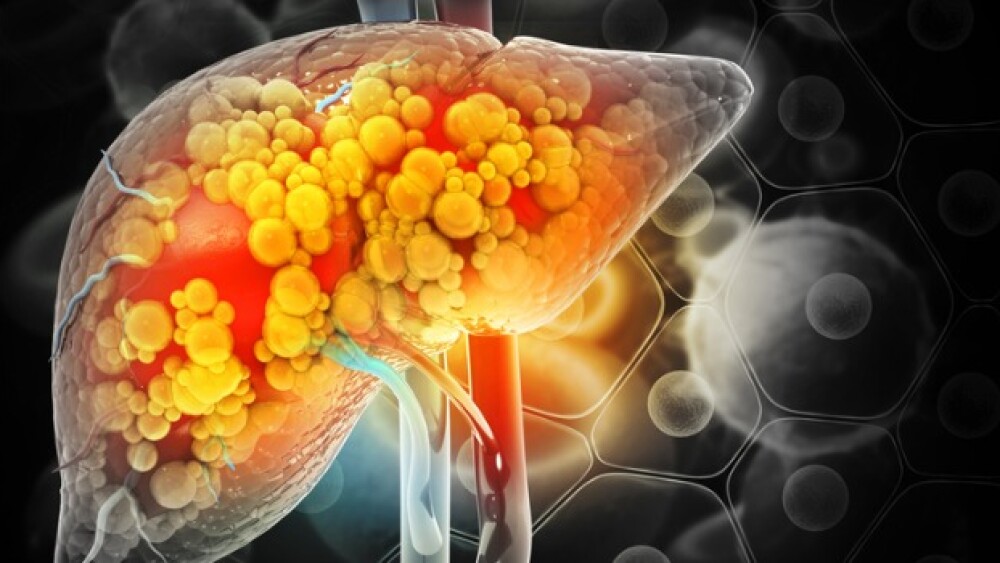With its FDA approval last week and first-to-market advantage, Madrigal Pharmaceuticals’ Rezdiffra will set the standard for other metabolic dysfunction-associated steatohepatitis candidates in development.
Pictured: Illustration of a liver with signs of fibrosis/iStock, Mohammed Haneefa Nizamudeen
The approval of Madrigal Pharmaceuticals’ Rezdiffra (resmetirom) for metabolic dysfunction-associated steatohepatitis is expected to open doors for future therapies, while also setting the efficacy and safety bar for upcoming candidates, according to a Friday report from data analytics firm GlobalData.
Madrigal’s regulatory victory will help it “reap the benefits of the first-to-market therapy,” Sravani Meka, GlobalData senior pharma analyst, said in a statement. Rezdiffra will be able to enjoy market dominance while its competitors are still trialing their candidates, and the therapy will be able to establish itself in clinical guidelines and standards.
This advantage will help Madrigal carve out its own piece of the MASH market, which GlobalData estimates to reach nearly $26 billion in 2032 across the seven major markets—the U.S., France, Germany, Italy, Spain, the U.K. and Japan.
Rezdiffra will also “set the standard for all other treatments in development” and “future therapies will now have to meet or outperform the efficacy and safety data from resmetirom’s Phase III MAESTRO studies,” Meka said.
The FDA granted accelerated approval to Rezdiffra on Thursday, making it the first-ever authorized therapy for metabolic dysfunction-associated steatohepatitis (MASH). Rezdiffra can now be used alongside diet and exercise to treat patients with moderate to advanced liver fibrosis. The treatment’s continued approval may depend on a future confirmatory trial validating its clinical benefit.
Importantly, the FDA’s clearance does not require patients to have undergone liver biopsies to be treated with Rezdiffra. In an investor note on Friday, William Blair analysts Andy Hsieh and Alexandra Ramsey said that this could “buoy biotech stocks” and “potentially accelerate and broaden patient access.”
Rezdiffra’s active ingredient is resmetirom, which is a small molecule, liver-directed drug that works by activating the thyroid hormone receptor beta (THR-β), which is highly enriched in the liver. The agonism of THR-β helps reduce intrahepatic triglyceride levels and boost lipid metabolism. According to Madrigal’s website, THR-β signaling is impaired in MASH patients, which triggers mitochondrial dysfunction, lipotoxicity and fibrosis.
The FDA’s approval was supported by data from a comprehensive clinical development program that includes 18 clinical trials, four of which are late stage. The core of Madrigal’s program is MAESTRO-NASH, which hit both of its primary endpoints with both 80-mg and 100-mg doses of Rezdiffra eliciting significantly higher rates of MASH resolution and improvement in liver fibrosis compared to placebo.
By clearing the FDA’s regulatory hurdles, Rezdiffra has bested at least 20 other MASH programs that have been suspended or discontinued, including Intercept’s obeticholic acid tablets and Akero’s efruxifermin.
Still, other biotechs are on Madrigal’s heels developing their own MASH therapies with differentiated mechanisms of action. Among the potential competitors are Novo Nordisk and Eli Lilly, which are developing their respective top-selling GLP-1 receptor agonists semaglutide and tirzepatide for MASH.
Also hoping to target the lucrative market is 89bio, whose FGF21 analog pegozafermin met its Phase IIb primary histology endpoint in March 2023.
For the William Blair analysts, Viking’s candidate VK2809 holds the most promise. Currently being assessed in the Phase IIb VOYAGE study, VK2809 could “potentially outshine Rezdiffra’s clinical profile,” Hiseh and Ramsey contend.
Tristan Manalac is an independent science writer based in Metro Manila, Philippines. Reach out to him on LinkedIn or email him at tristan@tristanmanalac.com or tristan.manalac@biospace.com.






